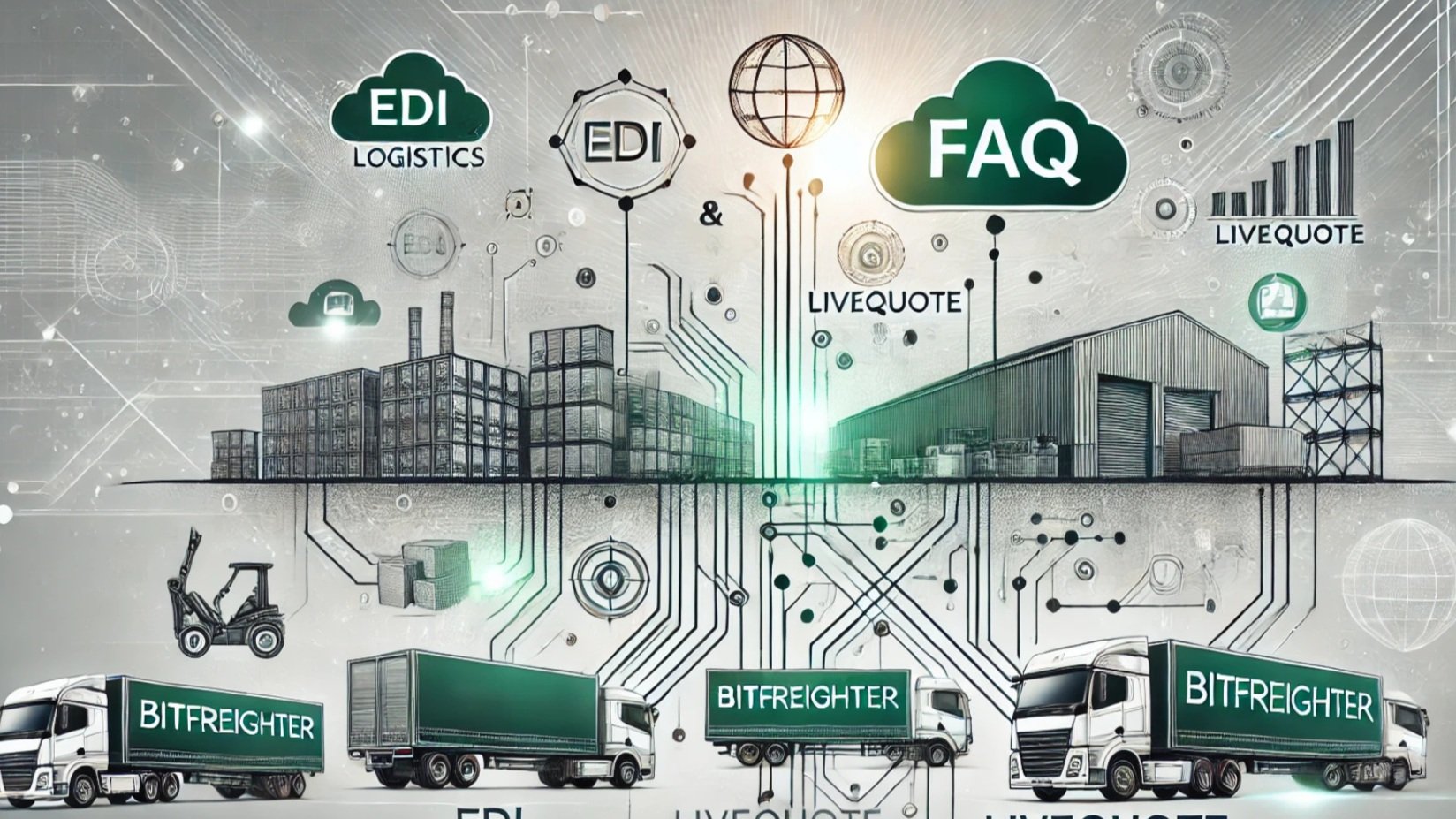
FAQs
Welcome to Bitfreighter's 2025 Frequently Asked Questions (FAQ) Section on Electronic Data Interchange (EDI) and LiveQuote!
We’ve compiled this detailed FAQ to help you understand EDI, LiveQuote, and how Bitfreighter’s innovative solutions can revolutionize logistics operations. Whether you’re new to EDI or looking to enhance your logistics processes, this guide covers everything you need to know. Let’s dive in:
What is EDI?
Electronic Data Interchange (EDI) is the electronic transfer of business documents such as purchase orders, invoices, and shipping notifications between organizations in a standardized format. By replacing paper-based communication, EDI allows for seamless and automated information exchange, increasing efficiency and reducing errors.
How Does EDI Benefit the Logistics Industry?
EDI brings a host of benefits to logistics, including:
Increased Efficiency: EDI automates data entry and streamlines communication between trading partners, resulting in faster order processing, reduced lead times, and fewer manual errors.
Cost Savings: By eliminating paper documents and minimizing human intervention, businesses save on printing, storage, postage, and labor costs.
Improved Data Accuracy: Automated data exchange significantly reduces the risk of human errors, ensuring precise and consistent information.
Enhanced Visibility: EDI offers real-time insights into supply chain processes, including shipment tracking, inventory levels, and order statuses. This enables better decision-making and more efficient logistics management.
Scalability: EDI supports the growing demands of businesses by facilitating high-volume transactions with minimal overhead.
What Are Common EDI Documents Used in Logistics?
Here are some essential EDI documents widely used in the logistics industry:
Load Tender (204): Requests goods or services from a supplier, detailing shipment specifics such as origin, destination, and required delivery date.
Tender Acceptance (990): Confirms receipt and acceptance of a load tender by the carrier.
Tracking and Status Updates (214): Provides real-time shipment details, including location updates, delivery timelines, and contents.
Invoice (210): Sent by suppliers to provide billing details for goods or services rendered.
Shipment Status (856): Communicates details about the contents and packaging of a shipment for better inventory management.
Do I Need Specific Software for EDI in Logistics?
Yes. Implementing EDI requires specialized software capable of converting data into the required EDI format and securely transmitting it to trading partners. EDI solutions can be standalone software or integrated into enterprise systems like Transportation Management Systems (TMS) or Enterprise Resource Planning (ERP) platforms.
How Secure Is EDI?
EDI prioritizes security to ensure the confidentiality and integrity of data. Key security measures include:
Encryption: Protects data during transmission to prevent unauthorized access.
Authentication: Verifies the identity of the sender and receiver.
Digital Signatures: Ensures the authenticity and integrity of transmitted documents.
Secure Protocols: Standards like AS2 (Applicability Statement 2) enable secure and reliable communication.
Can EDI Integrate with Emerging Technologies?
Yes, EDI can integrate with cutting-edge technologies like IoT and blockchain to enhance logistics operations:
IoT (Internet of Things): IoT devices provide real-time data on shipments, inventory levels, and environmental conditions, offering greater visibility into supply chain operations.
Blockchain: Ensures secure, transparent, and tamper-proof transaction records, fostering trust and collaboration among trading partners.
What is EDI 204?
The EDI 204 document is a critical tool in transportation logistics. It contains shipment details such as:
Origin and destination
Expected delivery date
Types and quantities of goods being transported
It’s used to communicate shipment instructions between carriers, shippers, and third-party logistics providers, streamlining communication and improving shipment accuracy.
How is EDI Used in Logistics?
In logistics, EDI simplifies and automates key processes, including:
Load Tendering (204): Streamlining shipment requests.
Status Updates (214): Providing real-time shipment tracking.
Electronic Invoicing (210): Ensuring accurate billing and faster payment cycles.
What is Bitfreighter?
Bitfreighter is a cutting-edge integration platform designed for logistics providers. Our solutions empower businesses to connect seamlessly with trading partners through advanced data exchange capabilities. Key features include:
Extensive Connectivity: Connect with multiple trading partners effortlessly.
User-Friendly Interface: Automate and optimize workflows with minimal effort.
Proprietary Technology: Build scalable, value-added freight networks with modern tools.
Does Bitfreighter Have an Open API?
Absolutely! Bitfreighter standardizes EDI into a JSON Open API format, enabling modern TMS platforms to handle EDI transactions without additional development resources. This streamlines integrations and accelerates adoption.
What is a VAN Connection?
A Value-Added Network (VAN) connection is a secure communication channel for EDI data exchange. It serves as a centralized hub for multiple trading partners, simplifying data sharing while maintaining high security and reliability standards.
What Are the Different EDI Connection Types?
EDI traditionally utilizes three primary connection methods:
FTP (File Transfer Protocol): Basic file-sharing protocol.
SFTP (Secure File Transfer Protocol): Adds encryption for secure file transfer.
AS2 (Applicability Statement 2): A robust protocol ensuring secure and direct communication between trading partners.
What Are Typical VAN Charges for EDI Transactions?
The average cost for transactional EDI via VAN ranges from $3 to $5 per load, depending on data volume and complexity.
Do I Need a TMS to Use EDI?
Not with Bitfreighter! Our LoadAccept platform enables logistics providers to handle EDI processes without a Transportation Management System. Receive load tenders, send acknowledgments, and update statuses seamlessly with our user-friendly solution.
What is Real-Time Rating?
Real-Time Rating is a transformative approach for logistics. It allows shippers to receive instant truckload quotes through automation. Bitfreighter’s LiveQuote tool empowers logistics providers to offer real-time quotes, enabling faster decision-making and improving service delivery.
Why Choose Bitfreighter?
Bitfreighter is more than a platform—it’s a partner in modernizing your logistics operations. We provide:
Comprehensive integration solutions
Real-time data visibility
Unparalleled customer support
Still Have Questions?
If you have additional questions or need tailored guidance, don’t hesitate to reach out. Our experts are ready to help you optimize your logistics operations and achieve EDI success.
Contact us today and see how Bitfreighter can transform your logistics processes!
